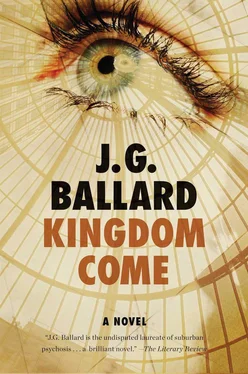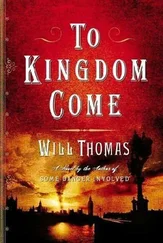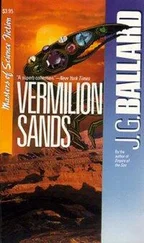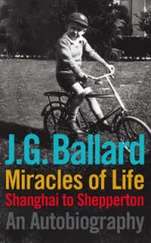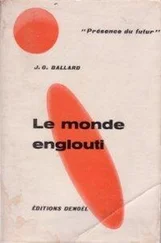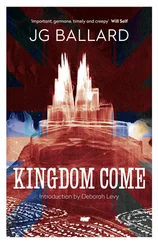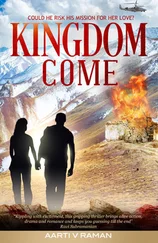Would they assume that I was the bomber? My father had died in the Metro-Centre, and leaving a bomb in the garage would strike the police as a likely act of revenge. The forensics officer had turned to watch me, and I noticed that I was waving the Jensen’s keys in my hand, a nervous tic that had come from nowhere.
I calmed myself, and searched for Sergeant Falconer. She was standing with a group of journalists who were questioning a uniformed inspector. In a transparent plastic bag he carried a trilby hat with a ragged hole through its crown. He removed the hat from the bag and showed it to the journalists. As he spoke, his fingers flicked at a fishing fly sewn into the hatband.
The journalists scribbled into their notebooks, clearly impressed by the hat. But I was watching Sergeant Falconer. Even in the harsh glare of the emergency lights her face was unnaturally blanched. The blood had drained from her cheeks, revealing the bones beneath her skin patiently waiting for their day. She turned and swayed, then stumbled against the inspector. Still talking to the journalists, he beckoned to two policewomen behind him and they quickly helped Sergeant Falconer towards the driving cab of a forensics van parked inside the crime-scene area.
Concerned for her, I tried to cross the nearest tape, but an officer ordered me away. As I backed off, trying to clear the stench and grit from my throat, I brushed past the young constable who had driven us from the hospital.
‘Is she all right?’ I held her arm. ‘Sergeant Falconer? She fainted . . .’
‘She’ll be fine. There’s bad news. We’ve found the first victim. Or what’s left of him.’
‘Dear God . . . where is he?’
‘In a nasty little jigsaw puzzle.’ She took my hand from her arm and stared at me shrewdly, still unsure whether I was a patient at the mental hospital. ‘Don’t breathe in too much or look at the soles of your shoes . . .’
‘I won’t.’ I pointed to the inspector dismissing the troop of journalists. ‘The hat? Was the dead man a local fisherman?’
‘A Brooklands solicitor. His name’s inside it. Geoffrey Fairfax.’ She raised the brim of her cap, debating whether to detain me as a possible suspect. ‘Did you know him, Mr Pearson . . . ?’
I THANKED THEconstable and climbed the steps beside the freight entrance, trying not to breathe until I reached the open air, and an even deeper darkness than the night.
17
THE GEOMETRY OF THE CROWD
THE POLICE WERE withdrawing from Brooklands, climbing into their patrol cars parked in the perimeter road and driving away from the mall. I walked through the huge crowd in the Metro-Centre plaza and filled my lungs with the sooty air, trying to expel the tang of dust and burnt rubber. The night hung heavily over the sullen faces, the darkness stained with the sweat of athletes’ bodies, the scent of chewing gum, bottled beer and anger.
Deep in the crowd, I stood on the running board of an unattended Land Cruiser and raised my head to a brief eddy of cooler air. Tom Carradine had gone, ending his frantic tennis game with himself, no doubt working on a flurry of cheerful press releases. The citadel had been breached, but the police were going, leaving the defence to a scratch brigade of PR executives, floor managers and secretaries.
Two officers in the last patrol car watched as a group of ice-hockey supporters surrounded a forgotten Volvo and drummed their fists on the roof, the familiar tribal tattoo. The windscreen shattered, but the policemen ignored the incident and drove away.
Only the forensics team remained in the basement garage of the Metro-Centre, picking through the debris of my car. Already I missed the classic Jensen, with its elegant body and huge American engine. I found it hard to believe that Geoffrey Fairfax had set out to kill me. Conceivably the solicitor had seen the bomber planting the device in my car, and tried to defuse it before I returned.
Or was I being framed by Fairfax and his shadowy group, set up as the likely bomber, obsessed by my hatred of the Metro-Centre? These were cold questions with even colder answers. The half decanter of Laphroaig I had downed in the penthouse had evaporated from my bloodstream the moment I recognized the shattered Jensen.
I watched the perimeter road, waiting for police reinforcements to arrive. A restless crowd several thousand strong surrounded the Metro-Centre, moving in vast currents within itself. Sports groups circled the mall, football and ice-hockey fans pushing past each other as they roamed the darkness. There was no hostility between the groups, but I could almost smell the anger, the coarse breath of a disturbed beast searching for an enemy.
An ice-hockey cheerleader, the blond thug who had attacked Duncan Christie, strode through the press of people, his fists punching the air. He was moving at random, gathering more and more spectators into his train. Then he lost them when they peeled away and followed a pair of huge weightlifters whose rolling gait cleared their way through the throng.
Family groups, fathers with teenage sons and wives keeping watch on their daughters, still gazed at the Metro-Centre as the last smoke rose through the fissure in the roof. But most of the spectators had turned their backs to the dome. The crowd was watching itself, a congregation of the night waiting for the service to begin.
The Land Cruiser heaved sharply, and a window pillar struck my cheek. I gripped the roof rack as the vehicle rocked from side to side. A group of athletics fans, middle-aged men in team shirts, surrounded the Land Cruiser and tore off the aerials and wing mirrors. People turned to watch them, with the detached stares of office workers viewing the excavation of a building site.
I stepped down from the running board and joined the crowd. A cheer went up as the Land Cruiser tilted on its offside tyres, received a final push and fell heavily to the ground like a stricken rhino. Its alarm lights came on, blinking in panic. Expert hands reached behind the petrol tank, and a clasp knife severed the fuel line. Petrol pooled around the rear tyre, a stench that made me gag.
A cigarette lighter flared in the darkness. There was a flash of light, and miniature flames glowed on the ground, racing around each other. The spectators moved back, hundreds of faces lit in a campfire circle. Then a single flame ten feet high lifted from the vehicle, and within an instant the Land Cruiser was an inferno of seared paintwork and exploding glass.
WHEN I REACHEDthe perimeter road, still waiting for the police to arrive, three more cars were burning. Smoke drifted over the heads of the crowd, and a few people followed me, shadowing my footsteps and changing direction as I did. Three ice-hockey supporters strode on my right, while an elderly couple in St George’s shirts kept in step on my left. Behind them came a large group of supporters, silently drinking from their beer cans. When I turned to avoid a traffic sign the entire column swung after me. I stopped to pick a strip of burnt rubber from my shoe, and they marked time without thinking, then resumed their strolling pace when I set off again.
None of them looked at me, or seemed aware that I was leading them. They followed me like commuters in a crowded railway terminal, trailing anyone who had found a gap through the press of travellers. The unique internal geometry of the crowd had come into play, picking first one leader and then another. Apparently passive, they regrouped and changed direction according to no obvious logic, a slime mould impelled by gradients of boredom and aimlessness.
Trying to lose them, I crossed the perimeter road. Ahead lay the Brooklands main thoroughfare, a high street of office buildings, shops and small department stores that led to the town hall. At least five hundred people were following my lead, though a few had overtaken me like pilot fish. Together we had drawn off other sections of the crowd in the Metro-Centre car parks. Groups of several hundred supporters crossed the perimeter road and set off through the side streets. Gangs of young men in St George’s shirts playfully rough-housed with each other. The Metro-Centre was forgotten, the last smoke rising from its dome, a mournful Thames Valley Vesuvius.
Читать дальше
Конец ознакомительного отрывка
Купить книгу
